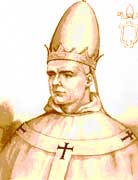 The
approach of the emperor's army inspired the Romans with such respect for Otto
that they sent to ask him to name his choice for pope. Otto promptly designated
his chaplain and cousin, Bruno. Bruno was thereupon elected and consecrated. He
took the name Gregory V.
The
approach of the emperor's army inspired the Romans with such respect for Otto
that they sent to ask him to name his choice for pope. Otto promptly designated
his chaplain and cousin, Bruno. Bruno was thereupon elected and consecrated. He
took the name Gregory V.
The first German pope was a young man in his twenties. He was
learned and could preach not only in Latin and German, but in the budding
Italian. He was a bit quick- tempered, but on the whole an excellent priest and
a good pope. On May 21, 996, Gregory crowned Otto emperor. Naturally enough, he
and Otto got along well together. But he could show his independence too, as
when he condemned the monk Gerbert for the attempt to take over the see of
Rheims; Gerbert was a friend of Otto's. When Gerbert submitted, however, he was
made archbishop of Ravenna. Emperor Otto had started for Rome at the request of
the late Pope John XV to check the tyranny of the Patrician Crescentius. The
Emperor intended to punish the usurper, but papal good nature prevailed and
Gregory begged the rascal off. It was a mistake.
Scarcely had Otto left Rome when Crescentius began to plot
against the Pope. Alarmed, Gregory begged Otto to return, but the Emperor was
unable to do so. Within a few months Crescentius drove the Pope out of Rome and
set up as antipope the Calabrian Greek, John Philagathus. Gregory went to Pavia
and held a synod. The synod condemned all those who supported the antipope and
excommunicated Crescentius. This synod also condemned King Robert of France for
attempting matrimony with his kinswoman Bertha. The next year, 998, after all
attempts to bring Crescentius and his antipope John XVI to their senses had
failed, Otto marched on Rome. Crescentius holed up in the Castle of St. Angelo;
the antipope fled to a castle in the country.
Without waiting upon the angry Emperor's arrival, a Roman
faction seized the antipope, tore out his eyes and tongue, cut off his ears and
nose, and confined him in a monastery. The Pope and Emperor made a triumphant
entry in February 998. Gregory held a Council which deposed John from his rank
as a priest. The mutilated wretch was then insulted by the mob and finally kept
in a monastery for the rest of his life. Crescentius held out stubbornly in St.
Angelo, but at last the Germans battered their way into the Castle. Crescentius
was beheaded on the battlements and his body tossed into the moat. In spite of
these political ups and downs, Pope Gregory found time to do much for
monasteries. The great religious reform of the coming century was to be powered
by monks, and Gregory V did his part in preparing for it by favoring these
spiritual champions against bishops, all too often mixed up in worldly and
political matters.
Gregory V died on February 4, 999.
Excerpted from "Popes
Through the Ages" by Joseph Brusher, S.J.

